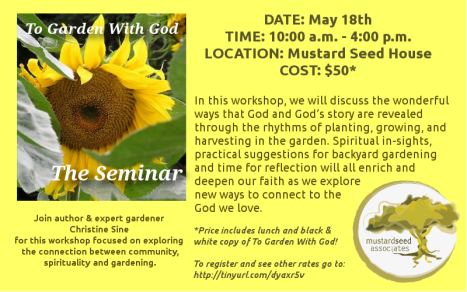Last week I shared this quote from Business Secrets of the Trappist Monks:
It is as though the materialism that has a death grip on this culture has taken our spirituality as well. Most of what’s called spiritual is actually humanistic if you think about it. People don’t want the adventure of God on his own terms or for his own sake. They want a better world, a happier life, better relationships and all the trimmings that go along with it….. We’re urged to seek God because this human good will come of it. People don’t realize “because” implies that the end is the human good and Truth (God) merely the means” (19)
It keeps coming back to my mind. How often do I pray because I want something from God, rather than because my heart aches for deeper intimacy with God? How often do I use God as the excuse for my own self centred agendas?
Some prayers are so obviously hedonistic they make us squirm when we hear others talk about them – praying for a parking place, or going on a Jesus spending spree where we expect Jesus to guide us to great bargains. But others are more subtle. Even desiring healing of loved ones can have a self centred purpose, after all illness and death disrupt our lives physically, emotionally and sometimes spiritually. If God healed more frequently life would be so much easier.
Or perhaps we want to see people in Africa fed and freed from starvation. We hate those images of starving children, their pain and suffering disrupts our lives. Yes, some of our response comes from the compassion of God welling up from within, but for many the uppermost emotion is: If God would just do something I would not have to respond and I could get rid of my guilt and once more feel at easy in my comfortable materialistic lifestyle. Sometimes these emotions reside in our subconscious rather than conscious minds, and as long as we are too busy to reflect on why we want something to change we are never aware of our self centred motives.
One of the commonest excuses I use and that I hear others use for not taking adequate time for God or with others is: but I enjoy what I am doing. I love my work. Unconsciously what we are saying is – My personal need for satisfaction in my work takes priority over my need to spend time with God.
Sometimes we even rope God into the equation – there is so much need God must intend me to burn myself out by responding to that need. The underlying subconscious thought – without me God cannot answer this need.
And then there is the excuse – But I have to feed and house my family. Again a very true statement and one that has many of us up at night consumed with anxiety. This believe it or not is one of those legitimate prayers. In the Lord’s prayer we regularly say Give us this day our daily bread. The problem is that we don’t expect God to provide bread for today we expect provision for the next 10, 15 or 20 years and we want to see where it is coming from NOW.
Don’t get me wrong, I am not suggesting that we don’t save for the future, though that is a way of life that some are called to, but sitting in the place of discernment, trusting that God will show us what we need to know now in order to provide, does not come easily to us. And we get uncomfortable because God might make it very clear that some of what we want for the future – like second homes, bigger cars and expensive vacations – may not be in God’s best plan for us. Even our desire for a bigger church, better paying job or higher profile ministry may not be in God’s plan – especially not if it takes time away from our number one priority – seeking God not for what we want but for what God wants – intimacy with us in every moment of the day.
What would our lives look like if we spent more time seeking God for God’s sake alone? How would it change our priorities, our time management, our use of resources? How would it affect our friendships? These are some of the questions I continue to grapple with. I hope you will take time to grapple with them too.
Filed under: Christianity, Rhythms of life, spirituality, sustainable living | Tagged: contemplation, intimacy with God, rhythm of life, spiritual practices, sustainable living | 8 Comments »
























